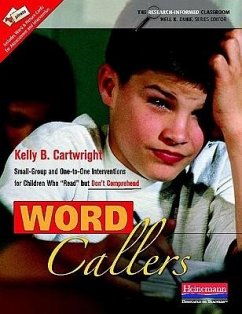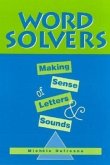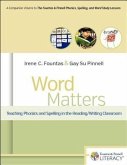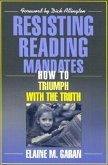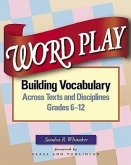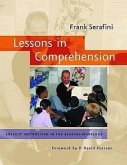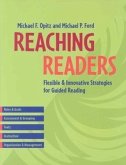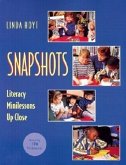Kelly B Cartwright
Word Callers
Small-Group and One-To-One Interventions for Children Who Read But Don't Comprehend
Herausgeber: Duke, Nell K
Kelly B Cartwright
Word Callers
Small-Group and One-To-One Interventions for Children Who Read But Don't Comprehend
Herausgeber: Duke, Nell K
- Broschiertes Buch
- Merkliste
- Auf die Merkliste
- Bewerten Bewerten
- Teilen
- Produkt teilen
- Produkterinnerung
- Produkterinnerung
LC copy imperfect: 1 binder lacking (84 word cards (4 x 4 in.) + 60 picture cards (4 x 4 in.) + 1 matrix (2 frames x 2 frames).
Andere Kunden interessierten sich auch für
![Word Solvers Word Solvers]() Michele DuFresneWord Solvers29,99 €
Michele DuFresneWord Solvers29,99 €![Word Matters Word Matters]() Irene FountasWord Matters71,99 €
Irene FountasWord Matters71,99 €![Resisting Reading Mandates Resisting Reading Mandates]() Elaine GaranResisting Reading Mandates36,99 €
Elaine GaranResisting Reading Mandates36,99 €![Word Play Word Play]() Sandra WhitakerWord Play43,99 €
Sandra WhitakerWord Play43,99 €![Lessons in Comprehension Lessons in Comprehension]() Frank SerafiniLessons in Comprehension42,99 €
Frank SerafiniLessons in Comprehension42,99 €![Reaching Readers Reaching Readers]() Michael F OpitzReaching Readers40,99 €
Michael F OpitzReaching Readers40,99 €![Snapshots Snapshots]() Linda HoytSnapshots50,99 €
Linda HoytSnapshots50,99 €-
-
-
LC copy imperfect: 1 binder lacking (84 word cards (4 x 4 in.) + 60 picture cards (4 x 4 in.) + 1 matrix (2 frames x 2 frames).
Produktdetails
- Produktdetails
- Verlag: Heinemann Educational Books
- Seitenzahl: 160
- Erscheinungstermin: 23. September 2010
- Englisch
- Abmessung: 277mm x 213mm x 23mm
- Gewicht: 980g
- ISBN-13: 9780325026930
- ISBN-10: 0325026939
- Artikelnr.: 32728304
- Verlag: Heinemann Educational Books
- Seitenzahl: 160
- Erscheinungstermin: 23. September 2010
- Englisch
- Abmessung: 277mm x 213mm x 23mm
- Gewicht: 980g
- ISBN-13: 9780325026930
- ISBN-10: 0325026939
- Artikelnr.: 32728304
"My hope in writing Word Callers," writes Kelly Cartwright," is to share insights into what makes word callers tick, as well as effective interventions that can help these children learn to enjoy the rich meaningful world of reading that they are missing." Her research has long focused on the importance of flexible thinking for skilled comprehension, and her word-and-picture card assessment and intervention developed as she observed that some students could read fluently but had surprising difficulty focusing on meaning. Kelly is an expert on reading comprehension, children's (and adults') thinking, and the development of literacy processes. Currently she is Professor of Psychology, Neuroscience, and Teacher Preparation at Christopher Newport University in Newport News, Virginia, where she serves as Chair of the Department of Psychology. Kelly is editor of Literacy Processes: Cognitive Flexibility in Learning and Teaching, which was nominated for the Ed Fry book award in 2008, and she has published articles in journals such as The Reading Teacher, the Journal of Educational Psychology, the Journal of Literacy Research, the Journal of Child Language, Early Education and Development, and the Journal of Cognition and Development. Kelly consults regularly with teachers and reading specialists in public and private schools around the country and is passionate about helping teachers discover the source of word callers' difficulties so that they can better differentiate instruction for children who struggle with reading comprehension. Kelly's work with word callers has struck a chord with reading teachers such as Sarah Sullivan from Gilberts, Illinois, who "consider it a much needed break-through in literacy pertaining to our collective need for a way to tap into reading comprehension via assessment and instruction." Another teacher writes, "I have read many books in my ten years as an educator about trying to reach these students, but NOTHING I have ever read was as well-written and simple to follow as this book. It should be required reading for every intermediate teacher." When she is not learning and teaching about reading and thinking, Kelly is actively involved in service to the broader reading community. Kelly serves the Virginia State Reading Association as President of Virginia College Reading Educators and as University Liaison to the Newport News Reading Council. She is a member of the editorial review boards of the Journal of Literacy Research and the Literacy Research Association Yearbook. In her home state, she served on the Higher Education Review Panel for the latest revision of the Virginia Standards of Learning in K-12 English Language Arts and Reading. Most recently Kelly consulted with the Virginia General Assembly's Joint Legislative Audit and Review Commission, which studied statewide reading performance in third grade. Their final report cited Word Callers as an excellent resource for meeting the needs of high-fluency/low-comprehrension readers. Kelly has served in national roles as Area Co-Chair for Elementary and Early Literacy Processes for the Literacy Research Association and as a member of the International Reading Association Professional Standards and Ethics Committee. Kelly is a member of the American Psychological Association Division 15 - Educational Psychology; the American Educational Research Association, Division C - Learning and Instruction; the Cognitive Development Society; the International Mind, Brain, and Education Society; the International Reading Association; the Literacy Research Association; the Society for Research in Child Development; and she is a voting member of the Society for the Scientific Study of Reading. In her local community, Kelly has worked with colleagues in the public schools to establish Literacy Partners, a tutoring program for struggling elementary readers (Cartwright, Savage, Morgan, & Nichols, 2009). She is currently working with university and K-12 colleagues to develop a Literacy Collaborative at a local elementary school: a partnership dedicated to sustained excellence in literacy learning and instruction. Kelly lives in Yorktown, Virginia, with three rescue dogs and enjoys reading, writing, and walking with her canine companions. For more information on, visit kellycartwright.com. Nell K. Duke, Ed.D., is a professor in literacy, language, and culture and also in the combined program in education and psychology at the University of Michigan. Duke received her Bachelor's degree from Swarthmore College and her Masters and Doctoral degrees from Harvard University. Duke's work focuses on early literacy development, particularly among children living in economic poverty. Her specific areas of expertise include the development of informational reading and writing in young children, comprehension development and instruction in early schooling, and issues of equity in literacy education. She has served as Co-Principal Investigator of projects funded by the Institute of Education Sciences, the National Science Foundation, the Spencer Foundation, and the George Lucas Educational Foundation, among other organizations. Duke has been named one of the most influential education scholars in the U.S. in EdWeek. In 2014, Duke was awarded the P. David Pearson Scholarly Influence Award from the Literacy Research Association, and in 2018 she received the International Literacy Association's William S. Gray Citation of Merit for outstanding contributions to research, theory, practice, and policy. She has also received the Michigan Reading Association Advocacy Award, the American Educational Research Association Early Career Award, the Literacy Research Association Early Career Achievement Award, the International Reading Association Dina Feitelson Research Award, the National Council of Teachers of English Promising Researcher Award, and the International Reading Association Outstanding Dissertation Award. Duke is author and co-author of numerous journal articles and book chapters. Her most recent book is Inside Information: Developing Powerful Readers and Writers of Informational Text through Project-based Instruction. She is co-author of the books Reading and Writing Informational Text in the Primary Grades: Research-Based Practices; Literacy and the Youngest Learner: Best Practices for Educators of Children from Birth to Five; Beyond Bedtime Stories: A Parent's Guide to Promoting Reading, Writing, and Other Literacy Skills From Birth to 5, now in its second edition; and Reading and Writing Genre with Purpose in K - 8 Classrooms. She is co-editor of the Handbook of Effective Literacy Instruction: Research-based Practice K to 8 and Literacy Research Methodologies. She is also editor of The Research-Informed Classroom book series and co-editor of the Not This, But That book series. Duke has taught preservice, inservice and doctoral courses in literacy education, speaks and consults widely on literacy education, and is an active member of several literacy-related organizations. Among other roles, she currently serves as advisor for the Public Broadcasting Service/Corporation for Public Broadcasting Ready to Learn initiative, an expert for NBC News Learn, and advisor to the Council of Chief State School Officers Early Literacy Networked Improvement Community. She has served as author or consultant on several educational programs, including Connect4Learning: The Pre-K Curriculum; Information in Action: Reading, Writing, and Researching with Informational Text; Engaging Families in Children's Literacy Development: A Complete Workshop Series; Buzz About IT (Informational Text); iOpeners; National Geographic Science K-2; and the DLM Early Childhood Express. Duke also has a strong interest in improving the quality of educational research training in the U.S.

